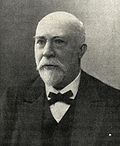| |||||||||||||||||||||||||||||
All 585 seats in the Chamber of Deputies 293 seats needed for a majority | |||||||||||||||||||||||||||||
|---|---|---|---|---|---|---|---|---|---|---|---|---|---|---|---|---|---|---|---|---|---|---|---|---|---|---|---|---|---|
| |||||||||||||||||||||||||||||
| |||||||||||||||||||||||||||||
Legislative elections were held in France on 6 and 20 May 1906. The elections produced an increased majority for the governing coalition between the Radicals (PRRRS) and the left Republicans (ARD), which had held power under the premierships of Maurice Rouvier and Ferdinand Sarrien since January 1905.
Contents
Sarrien resigned on 20 October for reasons of health. Georges Clemenceau, also a Radical, replaced him, and remained premier until July 1909, after which he went on to become one of the longest-serving French Prime Ministers. The Bloc des gauches formally dissolved with Clemenceau's coming to power.



